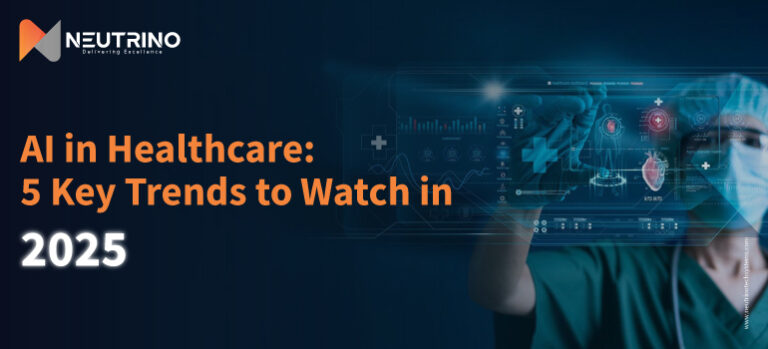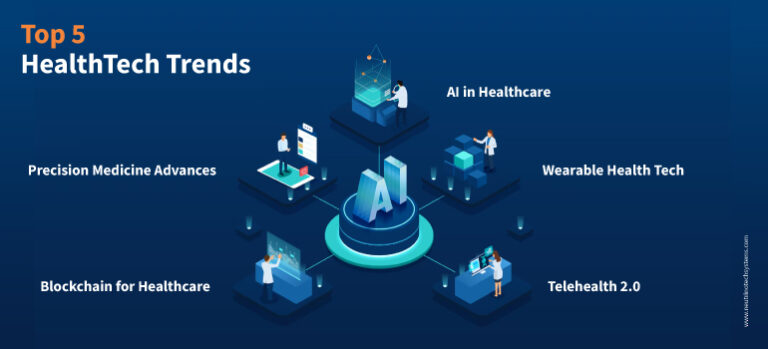AI in Healthcare: 5 Key Trends to Watch in 2025

- January 31, 2025
Adapting advanced tools and technologies is critical for better patient care since always. Over the years, revolutionary healthcare innovations have driven more effective treatments. The rise of AI in healthcare, in particular, has been a game-changer. The role of AI continues to expand year after year. As we enter 2025, AI-driven advancements are set to play a crucial role in shaping the future of patient care.
AI has already transformed healthcare over the past decade by improving diagnostic accuracy, tailored treatment plans, and operational efficiency. It is set to speed up even further.
By 2025, healthcare tech will make patient care more personalized. Explore how emerging trends are shaping AI in healthcare.
The Role Of Emerging Trends In Transforming Healthcare
Imagine starting your day by checking your smartwatch and instantly gaining insights into your health. By the time you wake up, your healthcare provider has already reviewed your vital signs from the night before and is ready with personalized recommendations. With no need for waiting rooms or lengthy appointments, healthcare becomes as seamless and immediate as checking your phone.
This vision of healthcare is quickly becoming today’s reality. As trends like remote health solutions, wearable tech, and AI-powered diagnostics evolve, the entire space of healthcare is shifting. These innovations are not just enhancing patient care—they’re transforming the entire healthcare journey, making it more accessible, efficient, and tailored to every individual.
A Look Back at 2024 – Telemedicine’s Impact in the U.S.
Before exploring 2025 trends, let’s reflect on 2024’s healthcare tech evolution. Telemedicine, which gained rapid adoption during the pandemic, continued to shape healthcare delivery in the U.S. in 2024. A survey showed 54% of Americans have used telehealth, with 89% satisfied. This highlights a shift toward virtual consultations for convenience.
The healthcare workforce crisis persisted in 2024, with staffing shortages affecting care. A recent report projected a 250,000+ registered nurses shortage by year-end. Staffing shortages led to 22% longer wait times and 15% lower satisfaction.
Meanwhile, hospital-owned specialty pharmacies continued to expand, making up 55% of total pharmacy spending in 2024, according to a study. This trend improved care coordination, added revenue, and managed high-cost therapies.
This shift reduced in-person visits by 25%, significantly lowering healthcare costs while improving accessibility for underserved populations. In 2025, telemedicine will expand with improved, more efficient technology.

5 Key Healthcare Technology Trends in 2025 To Look Out For
Healthcare tech trends are set to reshape the industry and improve care. Here’s a closer look
AI in Healthcare: The New Healthcare Professional
As per a study, AI has evolved from a supportive tool into a vital element of healthcare, helping clinicians analyze vast data sets, detect early health risks, and make timely interventions. As AI-powered tools became more integrated, they enhanced diagnostic accuracy and improved patient outcomes by personalizing care.
By 2025, AI will advance in healthcare, improving diagnostics and predicting disease progression. It will enhance personalized treatments and reduce diagnostic errors. Routine tasks will be automated, allowing providers to focus on critical care.
Wearable Health Tech: Health At Your Fingertips
Smart wearables have become key to proactive healthcare management. They monitor heart rate, blood pressure, glucose, and sleep. Devices like smartwatches help manage chronic conditions and prevent issues.
In 2025, wearables will integrate glucose monitoring and mental health tracking. With AI in healthcare, these devices will provide predictive insights, enabling early intervention.
Wearables will analyze habits and genetics for personalized health recommendations. They’ll empower patients to manage their health and reduce hospital visits. Continuous insights will improve wellness.
Telehealth 2.0: Virtual Care, Real Results
Telemedicine has already proven itself as an important tool in delivering healthcare remotely, especially in the wake of the pandemic. However, with Telehealth 2.0, we are seeing the evolution of virtual care into a more integrated and comprehensive digital ecosystem. This includes virtual consultations, remote patient monitoring, and the seamless exchange of medical records across digital platforms.
In 2025, Telehealth 2.0 will evolve beyond video consultations, featuring AI-powered chatbots, virtual health assistants, and immersive visits with AR and VR for diagnostics and treatment. Remote monitoring will be more advanced, with seamless data flow across platforms.
Healthcare services will become seamlessly integrated, creating a more accessible, efficient, and cohesive virtual care experience.
Blockchain for Healthcare: Data Security Revolutionized
Blockchain technology is set to transform healthcare by addressing issues related to patient data security, interoperability, and supply chain management. Blockchain’s decentralized, encrypted system provides an unalterable record of patient information, ensuring privacy and reducing the risk of data breaches. It also improves data sharing between healthcare providers, enhancing the ability to access and exchange patient records across platforms while maintaining security and confidentiality.
By 2025, blockchain will secure healthcare data and ensure transparency. It will streamline medical records, reduce test duplication, and improve accuracy.
Blockchain will also secure pharmaceutical and equipment supply chains, ensuring safety. This will make healthcare more efficient, reliable, and secure.
Precision Medicine Advances: Personalized Care, Perfected.
In 2025, precision medicine will advance with the fusion of genomics and big data. By using genetic information and patient data, treatments can be tailored to individuals. This offers more effective therapies with fewer side effects than traditional ones.
In 2025, precision medicine will move beyond cancer and rare diseases, expanding into more common conditions like diabetes and cardiovascular diseases. The integration of AI with genomic data will enable more accurate predictions about how a patient will respond to certain treatments, increasing the success rates of therapies.
New genetic testing will enable earlier intervention to prevent chronic diseases. Personalized treatments will become more common, improving patient outcomes. This will also help reduce long-term healthcare costs.
The Road Ahead: Challenges and Opportunities for Healthcare Technology
Healthcare technology’s future faces challenges in privacy and accessibility. As digital tools integrate into care, healthcare data becomes vulnerable to cyber threats. Smaller practices also struggle to invest in expensive tech. To tackle this, we need to focus on making these innovations accessible to everyone.
Regulatory hurdles also exist, as healthcare organizations navigate evolving laws around tech use. Clear guidelines will be crucial for safe and effective implementation.
AI is improving diagnostics, digital therapeutics, and remote monitoring for more personalized care. Collaboration between healthcare providers, tech companies, and governments will be essential. This will create a more secure, efficient, and patient-centered system.
Wrapping Up
The health tech industry will see major changes this year due to new advancements. These trends will make patient care more efficient and accessible.
These changes bring opportunities and challenges for healthcare providers and pharma. With 40% of U.S. patients already opting for telehealth and 82% of providers integrating virtual care, it’s clear that the demand for digital solutions will continue to rise.
Neutrino Tech Systems has supported major healthcare organizations globally, adapting to evolving needs. With a focus on secure, efficient medication delivery, we ensure safe, effective treatments. We create scalable solutions that empower providers and drive transformation.
